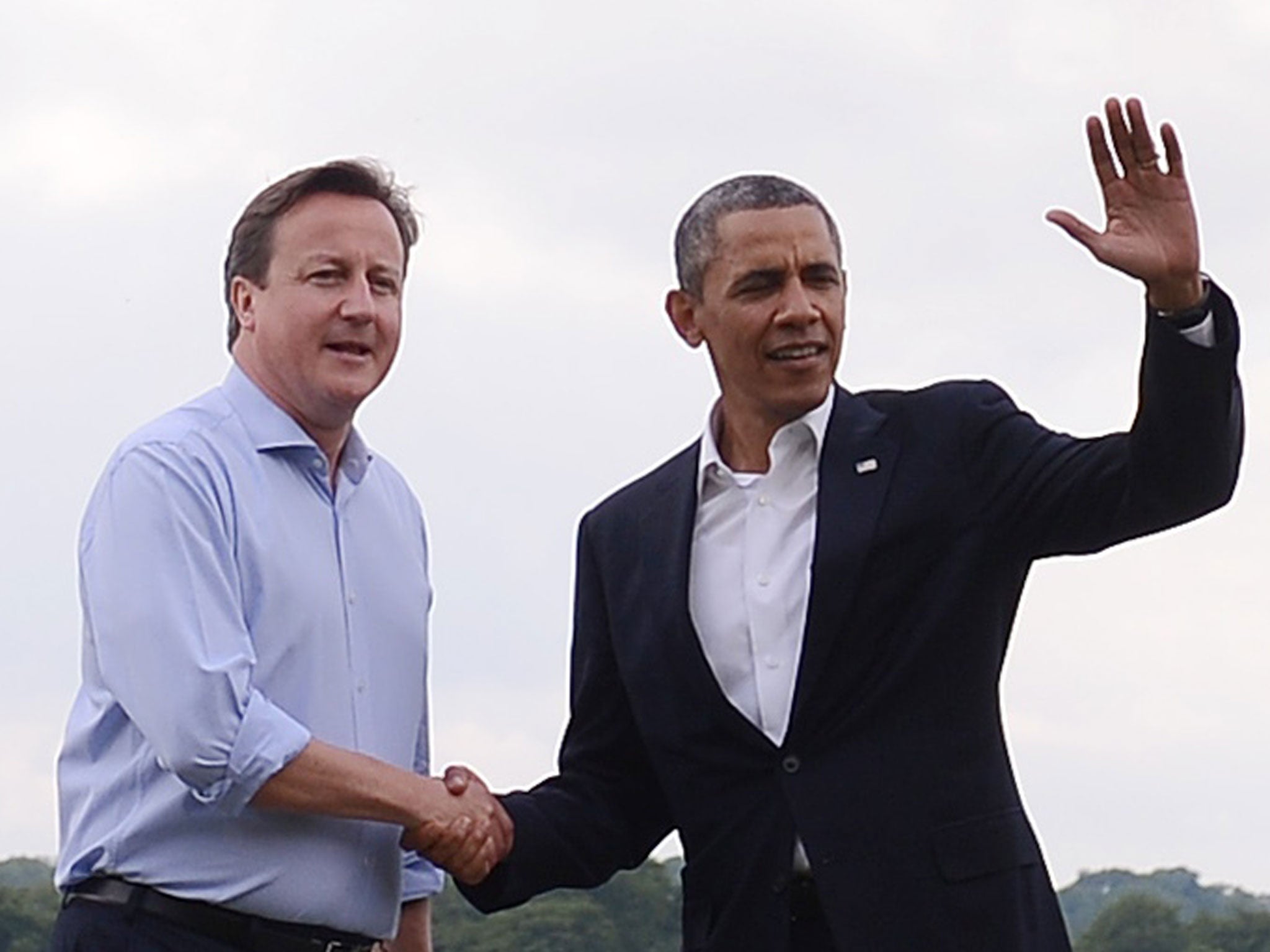'Biggest bilateral trade deal in history': David Cameron launches negotiations for US and EU agreement

Your support helps us to tell the story
From reproductive rights to climate change to Big Tech, The Independent is on the ground when the story is developing. Whether it's investigating the financials of Elon Musk's pro-Trump PAC or producing our latest documentary, 'The A Word', which shines a light on the American women fighting for reproductive rights, we know how important it is to parse out the facts from the messaging.
At such a critical moment in US history, we need reporters on the ground. Your donation allows us to keep sending journalists to speak to both sides of the story.
The Independent is trusted by Americans across the entire political spectrum. And unlike many other quality news outlets, we choose not to lock Americans out of our reporting and analysis with paywalls. We believe quality journalism should be available to everyone, paid for by those who can afford it.
Your support makes all the difference.David Cameron on Monday launched the negotiations on what he hailed as “the biggest bilateral trade deal in history” between the European Union and the United States.
The landmark free trade agreement could create a total of two million jobs on both sides of the Atlantic by boosting exports and growth. Mr Cameron said it could be worth £100bn to the EU economy, £80bn to the US and £85bn to the rest of the world. British officials believe it could benefit the UK by £10bn a year - more than £380 for every household.
Formal negotiations will start in July in Washington and it is hoped that they could be concluded by the end of next year. However, trade deals are notoriously hard to finalise and so the process could take longer.
The talks have been planned for months but Mr Cameron used the start of the G8 summit at Loche Erne in Northern Ireland to kickstart them in an attempt to show that the leaders were focused on measures that will make an impact in the real world.
"This is a once-in-a-generation prize and we are determined to seize it," said Mr Cameron."My agenda here is about helping hard-working families right here in the United Kingdom. If we sign trade deals and start trade negotiations here at this meeting in Northern Ireland, that will cut prices and mean a wider range of goods in shops here in the United Kingdom and jobs here in the United Kingdom."
Barack Obama, appearing alongside Mr Cameron at the launch, said he was confident of reaching an agreement."There are going to be sensitivities on both sides... but if we can look beyond the narrow concerns to stay focused on the big picture. I'm hopeful we can achieve [a deal]," he said.
There is some irritation in Brussels that Mr Cameron presented himself as the frontman for the talks at a time when the UK is debating whether to remain in the EU after his promise to call an in/out referendum by 2017. Supporters of EU membership in the UK claim that Britain would never be able to negotiate a trade deal with the US on its own and the proposed agreement is a good example of the EU's benefits.
Cabinet minister Ken Clarke, one of the most pro-European Conservatives, has warned Eurosceptics that they risk wrecking the prospect of the UK benefiting from the proposed trade deal. Writing in The Daily Telegraph, Mr Clarke said: "It is of course the EU that is making deals with America and Canada possible. It should come as no surprise that President Obama's officials have commented that they would have 'very little appetite' for a deal with the British alone.
"Quite simply, the political commitment and dedication that the creation of a free market encompassing over 800 million people, 47 per cent of world GDP, and boosting the combined economies of the EU and the US by nearly £180bn, could only ever be made by the leaders of evenly matched economic blocs."
Herman Van Rompuy, the president of the European Council, said: "Together Europe and the United States are the backbone of the world economy. Opening up that space further for opportunities for business and consumers is simply common sense."
The final obstacle to Monday's launch was removed on Friday when EU ministers agreed to French demands to exclude the film and television industry from the talks for the time being.
Thrashing out the details of the agreement could take up to two years to finalise and is expected to be "challenging".
Jose Manuel Barroso, the European Commission president, said:"We intend to move forward fast. I can say neither of us will give up content for the sake of speed but we intend to make rapid progress."
Mr Barroso said "huge benefits" were expected from reducing red tape between the two continents. He added: "Integrating two of the most developed, most sophisticated and certainly the largest economies in the world can never be an easy task but we'll find convincing answers to legitimate concerns, we'll find solutions to thorny issues, we'll keep our eyes on the prize and we will succeed."
Join our commenting forum
Join thought-provoking conversations, follow other Independent readers and see their replies
Comments